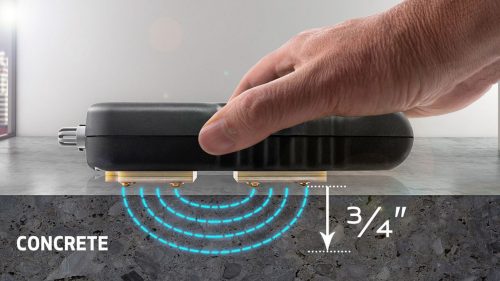Here at Structure Tech, we love our moisture meters. We use dual-purpose moisture meters that have both pin probes and scanners, and we use them all over the house. We scan floors around toilets, suspected wet areas at walls and ceilings, we use our pin probes on carpet tack strips in finished basements… and that’s just the start. I firmly believe every home inspector should use moisture meters during home inspections, even though home inspection standards of practice don’t require this.
Most moisture meters don’t work on concrete
I will make this short and sweet: nobody has any business using a moisture meter on concrete unless it’s a concrete moisture meter. A concrete moisture meter is an expensive one-trick pony I’ve never owned. They’re useful if you’re going to install a floor covering over concrete, and that’s about all. For this reason, I’ve never owned a concrete moisture meter, and I surely never will. As a home inspector, I have no use for this tool.
If I try using my wood moisture meter on concrete, it’ll peg my meter. This doesn’t mean the concrete is wet; it just means I’m using the wrong tool for the job.


Sean
December 12, 2023, 8:53 am
I use my Tramex on Concrete Masonry Units (CMU) all the time for qualitative interior analysis. The inside of that block wall shouldn’t test wet and the meter has a plaster/brick setting that doesn’t peg it every time. I agree with you 100% about poured concrete being untestable and that most moisture meters are useless for poured concrete. The most important point here is that inspectors need to know their tools, including the limitations, and be ready when a client’s dad asks about the validity of your approach.